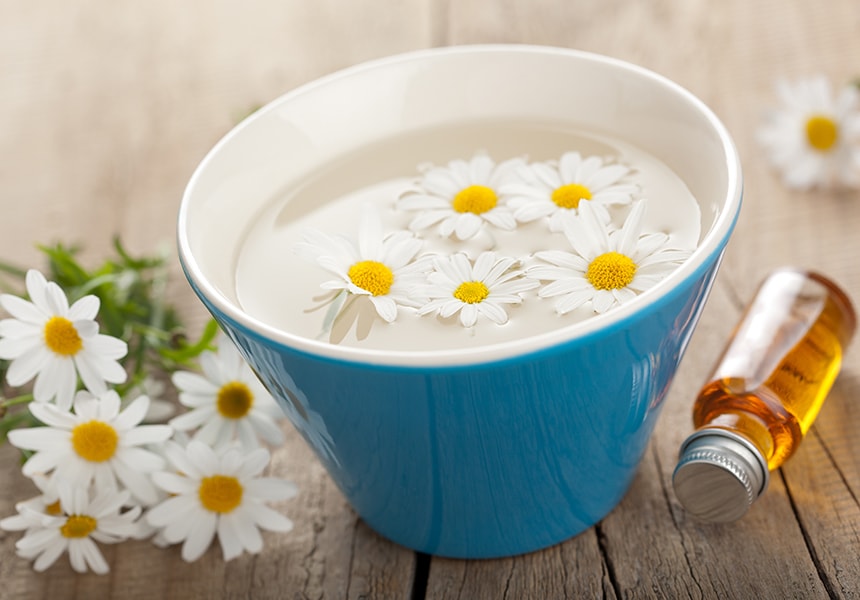Chamomile

Overview information
Chamomile (Matricaria Chamomilla) is a well-known medicinal plant. The two common varieties are German and Roman chamomile. This extraordinary herb is commonly used to treat many ailments such as hay fever, insomnia, and inflammation. Because of its medicinal value, chamomile is often referred to as the star among medicinal species.
Active Compounds in Chamomile
Chamomile possesses many healing properties because it contains different compounds such as terpenoids and flavonoids, natural compounds with pharmacological effects:
• α-bisabolol: an aromatic oil with anti-cancer properties and low toxicity for human cells.
• Bisabolol oxide A & B: compounds present in chamomile oil with pain relieving properties
• Chamazulene: an aromatic compound with anti-inflammatory and antioxidative effects.
• Farnesene: a hydrocarbon that reduces oxidative stress.
• Apigenin: an effective anti-cancer and anti-inflammatory compound
• Quercetin: a plant pigment that combats aging and oxidative stress
• Patuletin: a compound that relieves muscle spasms
-
Health Benefits of Chamomile
Chamomile Reduces Inflammation
Inflammation occurs due to the buildup of cyclooxygenase (COX) and nitric oxide (NO). A study in rats concluded that chamomile contains three terpenoids (α-bisabolol, bisabolol oxide A, and guaiazulene) that reduce inflammation by inhibiting COX. NO is produced by white blood cells in response to a threat or disease, and in high amounts can be toxic and leads to inflammation. Studies show that chamomile is an effective anti-inflammatory agent through decreasing NO production.
Chamomile Alleviates Heartburn
A study on 149 patients showed that chamomile, in combination with other herbs, effectively reduced heartburn in patients with several digestive disorders. However, because the treatment was a combination that included other herbs, the effectiveness of chamomile alone was not measured.
Chamomile Treats Inflammatory Bowel Disease
Inflammatory bowel diseases are chronic disorders characterized by disruption and ulceration of the digestive tract. Herbal extracts are an effective and natural treatment for inflammatory bowel disease symptoms. A study on rat colon samples revealed that chamomile extract is able to decrease inflammation by reducing serotonin levels and inflammatory molecules (MPO, IL-6, NF-kB, TNFα, PGE2, and 8-iso-PGF2α).
Chamomile Relieves Mucositis
Mucositis is the painful inflammation and ulceration of the mucous membranes lining the gut. A study involving 98 patients concluded that a mouth rinse of chamomile reduced symptoms of mucositis and prevented occurrence of severe mucositis in patients.
Chamomile Reduces Eczema
Eczema, medically known as atopic dermatitis, is an itchy inflammation of the skin. A study on rats concluded that German chamomile oil alleviates skin inflammation after application to the skin for 4 weeks.
Chamomile Promotes Skin Healing
Several animal studies have shown that chamomile extract promotes wound healing. Chamomile extract increased the rate of wound contraction and skin-cell formation in rats by increasing hydroxyproline (a peptide found in the skin that is responsible for healing). A study (RCT) involving 72 patients suggested that chamomile-treated wounds or cuts caused by surgery heal faster compared to those treated with hydrocortisone cream.

